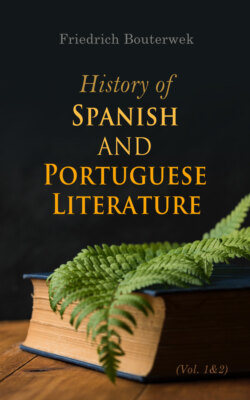Читать книгу History of Spanish and Portuguese Literature (Vol. 1&2) - Friedrich Bouterwek - Страница 21
На сайте Литреса книга снята с продажи.
THE MARQUIS OF VILLENA.
ОглавлениеTable of Contents
Previously to this period, before the poets had rendered the court of John II. the most brilliant society of the age, an eminent nobleman, the Marquis Enrique de Villena, was distinguished for his literary efforts. He sought to adorn his erudition with the lyric graces of the Limosin Troubadours, who had then attained their highest and final celebrity at the court of Arragon; and, thus united, to adapt both the learning and the poetry to the Castilian taste. He seemed called by birth to the performance of this task; for he was descended by the paternal side from the kings of Arragon, and by the maternal from those of Castile. His reputation for metaphysical and natural knowledge was so great, that he came, at last, in that ignorant age, to be regarded as a magician, and on that account he and his books were never mentioned but with horror. His talent for poetic invention was, however, an object of particular admiration with many of the poets of the age of John II. and among others of the Marquis de Santillana and Juan de Mena.
The Marquis of Villena was the author of an allegorical drama, which was performed at the court of Arragon in celebration of a marriage, and which may, therefore, be supposed to have been written in the Limosin rather than in the Castilian language. Among the characters stated to have been introduced into this drama, are Justice, Truth, Peace, and Clemency.70 Rhetorical and poetical competitions were instituted at Toulouse, in the year 1324, under the name of the Floral Games, to foster, by prizes and gallant ceremonies, the Troubadour spirit. This institution, which was soon after imitated in Arragon, was transplanted by the Marquis of Villena to Castile, but the result of that enterprize was not successful.71 The Marquis died at Madrid in 1434. A work supposed to have been printed at Burgos in 1499, under the title of Los trabajos de Hercules, (The Labours of Hercules), used formerly to be quoted as one of his poems; but from more recent investigations, it appears that this pretended poem was a mythological tale in prose.72 A translation of the Æneid by the Marquis, is besides mentioned, but this work appears also to be lost. A kind of art of poetry, which he wrote under the title of La Gaya Ciencia, has been more fortunate; for it has been partially preserved, and is still regarded with respect as the oldest work of the kind in the Spanish language.73 This treatise, however, does not deserve to be called an Art of Poetry, except in a very limited sense. It must have been intended as a necessary instruction, in the first place, for the Marquis of Santillana, to whom it is directly addressed, and doubtless, in the next, for the other members of the Institute of the Gay Science, (El Consistorio de la gaya Ciencia), which the Marquis of Villena had formed in Castile. In conformity with this object, the author relates the history of the Institute, endeavours to prove its utility, takes that opportunity of expressing his opinion on the object of poetry in general, and concludes with laying down the principles of Castilian prosody. These principles appear to have been particularly useful with reference to the conflict which then subsisted between the Castilian and Limosin tongues. Among his general observations on poetry, he says—“Great are the benefits which this science confers on civil society, by banishing indolence, and employing noble minds in laudable speculations: other nations have, accordingly, wished for and established among themselves, schools of this science, by which it has been diffused over different parts of the world.”74 It is obvious that this active nobleman was full of zeal for the improvement of the poetry of his country, and for the honour of that art which was cultivated with method and dignity in the Arragonian provinces, but which in Castile, where it was left to itself, appeared to stand in need of direction and encouragement. The difference between science and art was not more clearly perceived by the Marquis of Villena than by the other poets and men of learning of his age; and to distinguish the Castilian forms of romantic poetry from the Limosin, did not appear to him necessary. Thus, while his labours contributed to heighten the respect in which poetry and liberal pursuits were held, they had only an indirect influence on the improvement of Castilian poetry.
